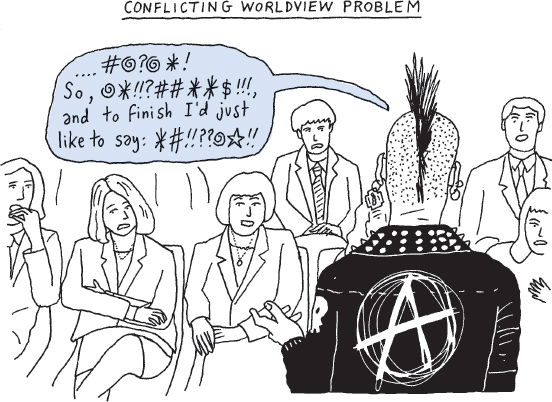Awareness of Audiences’ Cultural Diversity
Printed Page 24
Most effective and ethical public speakers today take into account the cultural backgrounds of their listeners. By culture, we mean the values, traditions, and rules for living that are passed from generation to generation.27 Culture is learned, and it influences all aspects of a person’s life, including religious practices, use of language, food choices, dress, and ways of communicating with others.

In the United States, public speakers have increasingly needed to consider the range of cultures represented by their audience members as American society has grown more culturally diverse. A 2012 Census Bureau Report concluded that forty million U.S. residents, or 13 percent, were born in another country—the highest percentage in over ninety years.28 Furthermore, just over half of all babies born in the United States are now members of “minority” groups.29 These trends are exemplified by a recent National Geographic map displaying the most common last names in the United States. Jones, Smith, and Anderson are prominent, as are Garcia, Martinez, Nguyen, and Kim.30

This trend is not limited to “gateway” states such as California, New York, and Florida: Nguyen is also the fourth most frequent name among Nebraska home buyers.31 Communication scholars have recognized the importance of understanding and relating to persons from diverse cultures. Myron Lustig and Jolene Koester note that it is no longer likely that your clients, customers, coworkers, or neighbors have the same values, customs, or first language as you do. Your career success and personal satisfaction will increasingly depend on how well you can communicate with persons from other cultures.32
The most effective public speakers are sensitive to their audience members’ cultural backgrounds. For example, they avoid biased language and ethnic jokes. They also adapt their delivery to acknowledge their awareness of different cultural norms regarding communication. For example, audience members from one particular culture might interpret extensive eye contact as rude or disrespectful, while individuals from another culture might welcome it. Savvy speakers take pains to identify the cultural norms of their audience and customize their presentation accordingly.
Click the "Next" button to try Video Activity 1.3, “Lama, Spirituality in Today’s World.
An audience member’s culture not only influences how he or she perceives a speaker’s behavior but also affects the person’s worldview—the “lens” through which he or she sees and interprets reality. Worldview in turn influences how listeners respond to a speaker’s message. For example, suppose your audience members’ culture maintains a worldview that says, “It’s not polite to challenge a speaker’s claims.” In this case, your listeners may decline to ask questions during or after your speech, since (to their thinking) asking questions may come across as being challenging and therefore disrespectful to you. But without questions, you don’t have the feedback you need to assess whether your listeners have understood you.
Listeners’ worldviews can also affect how they respond to a speaker’s ideas during a presentation. For instance, consider the continuing public debate on DREAM Act legislation (enacted in California in 2011), which gives undocumented immigrants who came to the United States as children some form of legal status if they serve in the military or complete a college education. Writer Maria Teresa Vanikiotis expressed one worldview that would lead to a favorable response to such a plan, noting that “it is . . . unfair to punish children for the offenses of their parents.” According to Vanikiotis, when young children are brought to this country and they grow up here, “they are Americans in every way but on paper” and “we owe them the opportunities and promise of America, which includes the right to an education.”33
The worldview of opponents of such legislation led to a very different response. For example, Ira Mehlman, media director for the Federation for Immigration Reform, contended that “parents are responsible for the consequences that their actions and choices have on their kids.” He said that while it was sad that children must suffer because of decisions their parents made, it was not the duty of America to “fix the mess you created for your kids.”34
Where do you stand on the DREAM Act debate? It depends on your worldview. More important, where does your audience stand on the topic that you’re discussing in your speech? By understanding your listeners’ worldviews, you can more easily gauge their likely reaction to your speech—and craft an appropriate and effective message.